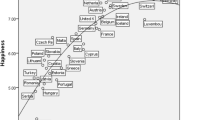Abstract
Race is an important dimension which survey researchers use to examine a number of social phenomena. Despite its importance, few researchers realize the measurement implications of using race as a proxy for experience and culture in statistical modeling. Particularly problematic is the tendency to use race and ethnic heritage interchangeably. This article proposes that one cannot use race and ethnic heritage interchangeably without impacting the results and interpretation. Through a case study, measurement errors in models that use race and ethnic heritage interchangeably to examine family decisions are explored. Results using race are different from results when ethnic heritage is used. This article concludes with a proposed framework for research that contrasts the utility of race and ethnic heritage in statistical models.
Similar content being viewed by others
References
Alba, R. D. (1990). Ethnic identity: The transformation of White America. New Haven: Yale University Press.
Angel, J., & Hogan, D. (1992). The demography of minority aging populations. Journal of Family History, 17, 95-116.
Aranda, M., & Knight, B (1997). The Influence of ethnicity and culture on the caregiver stress and coping process: A sociocultural review and analysis. Gerontologist, 37(3), 342-354.
Aspinall, P. J. (1998). Describing the 'White' ethnic group and its composition in medical research. Social Science and Medicine, 47, 1797-1808.
Bengston, V., Rosenthal, C., & Burton, L. (1990). Paradoxes of families and aging at the turn of the century. In R. Binstock & L. George (Eds.), Handbook of aging and the social sciences (pp. 263-287). New York: Academic Press.
Bowles, J., & Kington, J. (1998). The impact of family function on health of African American elderly. Journal of Comparative Family Studies, 29, 337-348.
Burton, L., Dilworth-Anderson, P., & Bengston, V. (1991). Creating culturally relevant ways of thinking about diversity and aging: Theoretical challenges for the twenty-first century. Generations, 15, 67-72.
Carroll, G. (1998). Mundane extreme environmental stress and African American families: A case for recognizing different realities. Journal of Comparative Family Studies, 29, 271-284.
Connell, C., & Gibson, G. (1997). Racial, ethnic, and cultural differences in dementia caregiving: Review and analysis. The Gerontologist, 37(3), 355-364.
Dilworth-Anderson, P., & Anderson, N. (1994). Dementia caregiving in Blacks: A contextual approach to research. In E. Light, G. Niederehe & B. Lebowitz (Eds.), Stress effects on family caregivers of Alzheimer's patients (pp. 385-409). New York: Springer Publishing.
Edmondson, B. E., & Nkomo, S. (1998). Armoring: Learning to withstand racial oppression. Journal of Comparative Family Studies, 29, 285-296.
Folbre, N. (1996). The economics of the family. Northampton, MA: Edward Elgar Publishing, Inc.
Fredman, L., Daly, M., & Lazur, A. (1995). Burden among White and Black caregivers to elderly adults. Journal of Gerontology, 50, S110-S118.
Geertz, C. (1963). The integrative revolution: Primordial sentiments and civil politics in the states. Old societies and new states. New York: Free Press.
Gibson, R. (1989). Guest Editorial: Minority aging research: Opportunity and challenge. Journal of Gerontology: Social Sciences, 44, 2-4.
Greenberg, S. B. (1980). Race and state in capitalist development. New Haven: Yale University Press.
Himes, C. (1992). Social demography of contemporary families and aging. In L. Burton (Ed.), Families and aging (pp. 23-31). Amityville, NY: Baywood.
Hinrichsen, G., & Ramirez, M. (1992). Black & White dementia caregivers: A comparison of their adaptation, adjustment and service utilization. The Gerontologist, 32, 375-381.
Holtz, V. J., Klerman, J., & Willis, R. (1997). The economics of fertility in developed countries. In M. Rosenweig & O. Stark (Eds.), Handbook of population and family economics (pp. 275-347). Amsterdam, Netherlands: Elsevier.
Horowitz, A., & Reinhard, S. (1995). Ethnic differences in caregiving duties and burdens among parents and siblings of persons with severe mental illnesses. Journal of Health and Social Behavior, 36(2), 138-150.
Horton, H., & Allen, B.(1998). Race, family structure and rural poverty: An assessment of population and structural change. Journal of Comparative Family Studies, 29, 397-406.
Hout, M., & Goldstein, J. (1994). How 4.5 million immigrants became 40 million Irish Americans: Demographic and subjective aspects of the ethnic composition of White Americans. American Sociological Review, 59, 64-82.
Isaacs, H. (1975). Basic group identity: The idols of the tribe. In N. Glazer & D. Moynihan (Eds.), Ethnicity: Theory and experience (pp. 29-52). Cambridge, MA: Harvard University Press.
Jackson, J. S. (1989). Methodological issues in survey research on older minority adults. In M. P. Lawton & A. R. Herzog (Eds.), Special research methods for gerontology (pp. 137-156). Amityville, NY: Baywood.
Jackson, R., & Garner, T. (1998). Tracing the evolution of 'race,' 'ethnicity' and 'culture' in communication studies. Howard Journal of Communications, 9, 41-55.
James, A. (1998). What's love got to do with it?: Economic viability and the likelihood of marriage among African American men. Journal of Comparative Family Studies, 29, 373-386.
Keith, V., & Smith, D. (1988). The current differential in Black and White life expectancy. Demography, 25, 625-632.
Kim, H., & McKenry, P. (1998). Social networks and support: A comparison of African Americans, Asian Americans, Caucasians and Hispanics. Journal of Comparative Family Studies, 29, 313-334.
Krause, N. (1988). Gender and ethnicity differences in psychological well-being. In G. Maddox & M. P. Lawton (Eds.), Annual review of gerontology and geriatrics, 8, (pp. 156-196). New York: Springer Publishing.
Markides, K., & Charles, M. (1987). Aging and ethnicity. Beverly Hills: Sage.
Markides, K., Liang, J., & Jackson, J. (1990). Race, ethnicity and aging: Conceptual and methodological issues. In R. Binstonck & L. George (Eds.), Handbook of aging and the social sciences (pp. 112-129). New York: Van Nostrand-Reindhold.
Mausner, J., & Bahn, A. (1974). Epidemiology: An introductory text. Philadelphia: W. Sanders.
Menchik, P. (1996). Household and family economics. Boston, MA: Kluwer Academic Publishers.
Omi, M., & Winant, H. (1986). Racial formation in the United States. New York: Routledge and Kegan Paul.
Pettigrew, T. (1979). The ultimate attribution error. Personality and Social Psychology Bulletin, 5, 461-476.
Quinn, J. (1987). The economic status of the elderly: Beware of the mean. Review of Income and Wealth, 33, 63-82.
Rosenweig, M., & Stark, O. (1997). Handbook of population and family economics. Amsterdam, Netherlands: Elsevier.
Rotheram, M., & Jean, P. (1987). Introduction: Definitions and perspectives in the study of children's ethnic socialization. In J. Phinney and M. Rotheram (Eds.), Children's ethnic socialization (pp. 10-28). Beverly Hills: Sage.
Schermerhorn, R. (1978). Comparative ethnic relations. Chicago: University of Chicago.
See, K. O., & Wilson, W. (1988). Race and ethnicity. In N. Smelser (Ed.), Handbook of sociology (pp. 223-242). Newbury Park, CA: Sage.
Shils, E. (1968). Color, the universal intellectual community, and the Afro-Asian intellectual. In J. H. Franklin (Ed.), Color and race (p. 4). Boston: Beacon Press.
Stafford, S. (1987). The Haitians: The cultural meaning of race and ethnicity. In N. Foner (Ed.), New immigrants in New York (pp. 131-158). New York: Columbia University Press.
Taylor, R. J. (1988). Aging and supportive relationships among Black Americans. In J. Jackson (Ed.), The Black American elderly: Research on physical and psychological health (pp. 259-281). New York: Springer.
Thornton, M., Van Tran, T., & Taylor, R. (1997). Multiple dimensions of racial group identification among adult Black Americans. Journal of Black Psychology, 23, 293-309.
Thornton, M. C., White-Means, S., & Choi, H. K. (1993). Sociodemographic correlates of the size and composition of informal caregiver networks among frail ethnic elderly. Journal of Comparative Family Studies, 24, 235-250.
Wallace, S. P., Levy-Storms, L., Kington, R. S., & Andersen, R. H. (1998). The persistence of race and ethnicity in the use of long-term care. Journal of Gerontology: Social Sciences, 53(2), S104-S112.
Waters, M. (1990). Ethnic options. Berkeley: University of California Press.
Waters, M. (1994). Ethnic & racial identities of second generation Black immigrants in New York City. International Immigration Review, 28, 795-820.
Webster, Y. (1992). The racialization of America. New York: St. Martin's Press.
White-Means, S. (1995). Conceptualizing race in economic models of medical utilization: A case study of community-based elders and the emergency room. Health Services Research, 30(1), 207-223.
White-Means, S., & Thornton, M. C. (1990a). Ethnic differences in the production of informal home health care. The Gerontologist, 30, 758-768.
White-Means, S., & Thornton, M. C. (1990b). Labor market choices and home health care provision among employed ethnic caregivers. The Gerontologist, 30, 769-775.
Whitfield, K., & Baker-Thomas, T. (1999). Individual differences in aging minorities. International Journal of Aging and Human Development, 48, 73-79.
Wilkinson, D., & King, G. (1987). Conceptual and methodological issues in the use of race as a variable: Policy implications. Milbank Quarterly, 65, 56-71.
Wilson, W. (1987). The truly disadvantaged. Chicago, IL: University of Chicago Press.
Wolpin, K. (1997). Determinants and consequences of the mortality and health of infants and children. In M. Rosenweig & O. Stark (Eds.), Handbook of population and family economics (pp. 483-557). Amsterdam, Netherlands: Elsevier.
Author information
Authors and Affiliations
Rights and permissions
About this article
Cite this article
Thornton, M.C., White-Means, S.I. Race Versus Ethnic Heritage in Models of Family Economic Decisions. Journal of Family and Economic Issues 21, 65–86 (2000). https://doi.org/10.1023/A:1009479514511
Issue Date:
DOI: https://doi.org/10.1023/A:1009479514511




